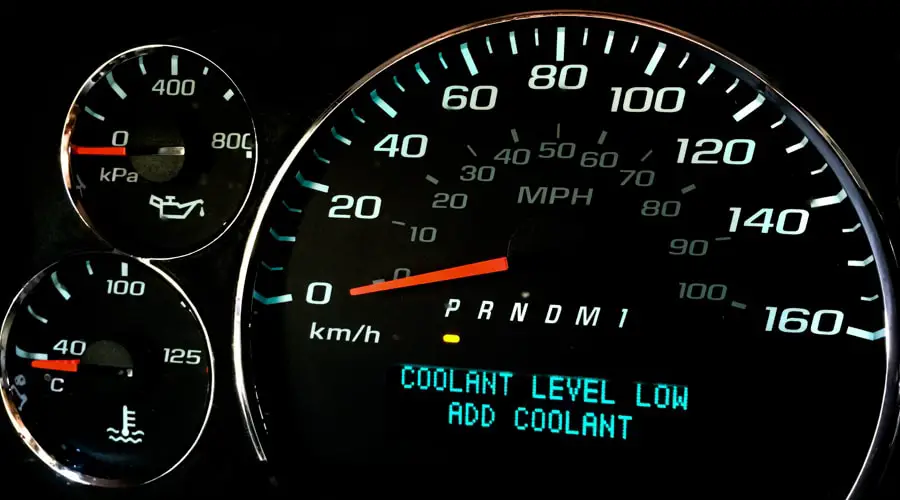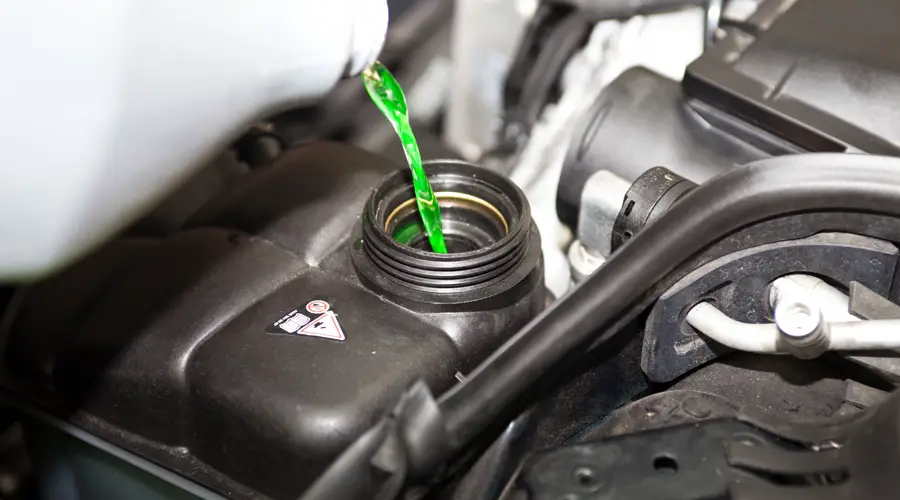
One of the biggest reasons that cars break down is because they overheat, indicating a problem with the cooling system. But the truth is that problems with your car’s cooling system can start long before your engine overheats. In fact, if you know what to look for, you may be able to catch the problem early enough that you can prevent overheating and potentially save yourself a lot of money on extensive repairs.
One of the most important parts of the cooling system is antifreeze and an antifreeze leak may be the first sign that there’s a problem. Most of the time, they’re easy to repair, though that really depends on the cause and location of the leak. Regardless, it’s always better to get an antifreeze leak taken care of before the engine starts overheating and you run the risk of causing further damage.
Let’s take a look at the things you need to know about your car leaking antifreeze but not overheating.
What Is Antifreeze?
Some people think that antifreeze and coolant are the same but it’s not quite that simple. Coolant is usually an equal mix of antifreeze and water, though the two terms are often used interchangeably.
Antifreeze both lowers the freezing point and raises the boiling point of the liquid in the cooling system. So, it keeps it from freezing when the weather is extremely cold and prevents excess evaporation when it gets really hot, making sure there is enough in the coolant system to maintain proper engine temperature.
You usually see two different colors of antifreeze, orange and green. The only real difference between them is that orange antifreeze has an extended life and lasts longer than the green kind. Either color can be mixed with water to create coolant and should never be poured directly into the engine system.
What Exactly Does Antifreeze Do?
When mixed with water and used as a coolant, antifreeze circulates through the engine and radiator, redistributing the heat from the engine to keep it from overheating. It also prevents the fluid from freezing in the winter, which is how it got its name. Antifreeze also acts as a lubricant, helping everything run as smoothly as possible.
Why Your Car Is Leaking Antifreeze but Not Overheating

Source: canva.com
When you notice leaking antifreeze but your car isn’t overheating, it’s not the disaster you might think it is. Not yet. That said, it is something that you have to take very seriously because, if you don’t, you’ll have bigger problems in the future like blown head gaskets.
If you find an antifreeze leak, you may have gotten very lucky because you still have a chance to fix the problem before any significant damage occurs. Why? Because even though you don’t have an overheating engine now, it will if you don’t find and repair the source of the coolant loss. Overheated engines can cause a lot of damage so it’s better to find a problem like this early.
There are a few things that could be causing a radiator leak. Some are pretty obvious while others are not. They include:
1. A Worn Out or Cracked Radiator Cap
The radiator cap is put under a lot of pressure and can weaken or wear out altogether. In this case, the pressure inside the radiator pressing against a faulty cap can lead to loss of fluid. You may notice antifreeze overflowing onto the ground. If this is the cause of the leak, it’s usually a quick and easy fix. Just replace the radiator cap.
2. A Cracked Heater Core
The heater core draws warm air in from the cooling system and distributes it into the passenger cabin. If it cracks, you might notice a sweet smell when you’re in the car. This is the smell of antifreeze and indicates that there’s a leak, even if you can’t see it yet. When heater core damage is really bad, coolant or antifreeze may start to leak into the car from the engine which can indicate extensive damage.
3. Holes in the Radiator or Hoses
Large holes or cracks in the radiator or a broken radiator hose can also cause coolant leakage and, in this case, the leak happens rapidly. You’ll probably notice a large puddle of engine coolant under your car and your car will overheat pretty quickly if you attempt to drive it.
4. An Overfilled Tank
Make sure you haven’t overfilled the coolant reservoir. Overfilling can cause the coolant to escape when the engine heats up.
5. A Faulty Water Pump
The water pump is a common source of coolant leaks. Check for any visible leaks or signs of wear. If you suspect a water pump issue, it may need to be replaced. Unfortunately, this can be a costly repair (upwards of $900 for parts and labor)!
Read our detailed guide on repairing a coolant leak in your reservoir tank.
Troubleshooting and Repairs
Here are some tips to help you determine if you have a leak and what you should do next.
- You might smell a leak before you see one. Antifreeze smells sweet. If you smell it, you probably have a small leak that isn’t causing problems with overheating yet but that should be checked out as soon as possible.
- Check your antifreeze level regularly, even if you don’t see an obvious leak. If you have to keep topping the engine off with coolant, know that this isn’t normal and there’s likely a leak somewhere.
- Check under your car for coolant. If you see coolant under your engine, obviously, there’s a leak and you need to have it taken care of. Finding the source of the leak isn’t always easy which is why it’s a good idea to talk to your mechanic.
As far as repairs, it’s much easier and less expensive to get a coolant leak repaired before your engine starts to overheat. Minor leaks can usually be treated with additives that you can find at an auto parts store. That said, products like these aren’t permanent fixes but they may buy you a little time until you have to time or budget for a proper repair.
If you see or smell leaking antifreeze but your car isn’t overheating, don’t convince yourself that you don’t have a problem. It’s still very important to have your car checked out before the problem gets worse and causes even more damage.
Source of Featured Image: canva.com